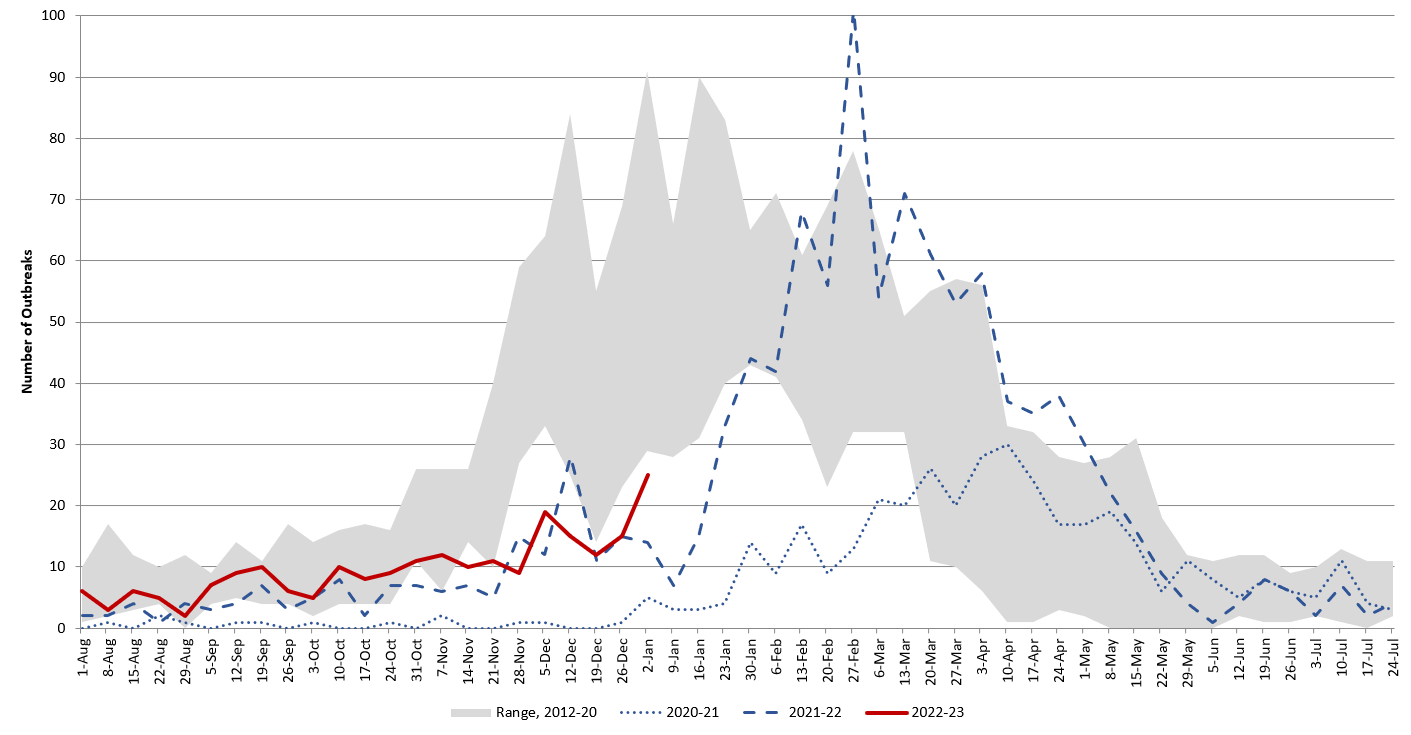New York (February 7) – An outbreak of apparent Norovirus at a Las Vegas elementary school January 27 has sickened 130 students. And the “CDC says Norovirus cases are spiking across the country”, according to a recent report. The outbreak and the warning highlights that we're in the season for this highly contagious, mostly food-borne illness. CDC reporting of outbreaks reiterates the threat. As of the first week of January, we're on a path the highest rate of Norovirus since before the pandemic, but below the 8 year average run from 2012 to 2020.

NOROStat Norovirus Reporting (CDC)
For the most part, all these incidents of Norovirus are short-lived, days long instances that are covered, primarily, by the local press and rarely gain traction in national or even regional media. But they certainly can if the Norovirus outbreak happens to:
- a large number of people;
- in a major media market or affecting a high profile entity or person (e.g., the Boston College basketball team was sickened at the Cleveland Place restaurant in 2015);
- among two or more restaurants of the same chain; or
- if there is some other food-borne illness (e-coli, salmonella, listeria, etc.) in conjunction with or shortly before or after the Norovirus outbreak.
The period after the Covid 19 pandemic is likely to continue with surging illnesses we've already seen. It will be worse, in our view, because most of the restaurants, hotels, cruise lines, and nursing facilities employee low-paid staff with high turnover. That, together with fading institutional memory during the three years of the pandemic will likely relax Norovirus protocols, such as the Norwalk protocol.
Norovirus Generally
According to the CDC, Norovirus is a very contagious virus that causes vomiting and diarrhea. People of all ages can get infected and sick with norovirus. It can lead to dehydration. Every year, it causes about 60,000 hospitalizations and around 600 deaths, mostly among small children and the elderly. It is highly contagious and can live for several days on contaminated surfaces. Some disinfectants are ineffective against Norovirus. There are several different strains of the virus. There is no vaccine for it and no cure. One must simply “ride it out” with treatment.
Restaurants
In the short term, an outbreak of Norovirus can devastate a restaurant stock. It can have an enormous downside reputational risk from which companies will be hard-pressed to recover.
In October 2015, an outbreak at the Chipotle (CMG) in the Cleveland Circle Chipotle near Boston College sickened at least 130 students and caused students to essentially boycott the place for several years thereafter. (I visited the location a few times in the following years. A small, local, competitor nearby was always chock full of customers; the CMG restaurant – which is still there — was empty.) From the opening September 30 to the close December 1 – two months bookending the Boston College outbreak – Chipotle shares fell from $717.60 to $479.85 per share. While Chipotle has largely cleaned up its act (after adopting many of the protocols I recommended in my very first article on SA, I am proud to say), like many other chains, people still claim to have been sickened by Chipotle on food safety reporting boards.
The worst thing that can happen is that Norovirus — relatively common — compounds with a more deadly food-borne illness like e-Coli. In 2022, for example, 109 people were sickened with e-coli bacteria, with 52 hospitalized, over 6 states from a source that was ultimately unidentified. However, 80% of those sickened reported eating at Wendy's hamburger restaurant. The FDA maintains a log of active and closed investigations here.
Cruise Ships and Hotels
- Tobias, Andrew (Author)
- English (Publication Language)
- 320 Pages - 04/19/2022 (Publication Date) - Harper...
- Reference Guide, Investment Lawyer's (Author)
- English (Publication Language)
- 46 Pages - 07/12/2019 (Publication Date) -...
Cruise ships and hotels are vulnerable because quarters tend to be very close, they house transients who could be traveling with the illness, they serve food, and staff turnover tends to be high so that training is haphazard.
One of the best guides I have seen for the hospitality industry to combat Norovirus for is this booklet from the Vancouver health authorities. It lays out in considerable detail how hoteliers must work to manage a virus outbreak and how to prepare for one.
Nursing facilities
Nursing facilities are particularly vulnerable to Norovirus for many of the same reasons as cruise ships and hotels. But they are even more so because they most often house elderly patients who are tremendously vulnerable to death from dehydration and Norovirus.
Investment Thesis
Smaller chains are likely to be more vulnerable to the Norovirus downside. Not only will a Norovirus shutdown have a greater percentage impact on gross revenues, but smaller chains tend to be less focused on employee training and prevention protocols. Preventive measures include unlimited staff paid days off for illness, symptom surveys at the start of a shift, a robust cleaning regimen and frequent worker handwashing, properly, with soap and water, no less than once an hour if Norovirus is “going around” in the community; preferably more often.
All those training and prevention efforts eat away at margins and productivity in lower margin chains more than larger more profitable chains. Thus discount chains, like Choice Hotels (CHH) are more likely to suffer financial consequences from a Norovirus outbreak than higher-priced, much higher margin chains like Marriott (MAR).
What is particularly insidious is that the initial symptoms of the three more dangerous illnesses – e-coli, salmonella, and listeria, which are bacterial – mimic those of Norovirus and can only be ruled out by lab tests. Thus, for investors, a “Norovirus” outbreak should be treated as though it is one of the more deadly pathogens until they are ruled out by lab tests.
While Norovirus can happen in any restaurant, the more severe bacterial illnesses tend to occur most frequently where raw foods are used or raw foods are cooked from raw for consumption. That puts extra pressure on QSR restaurants like Shake Shack (SHAK), Chipotle (CMG) and Potbelly (PBPB), where much of the menu is cooked from raw or uses raw produce like lettuce and tomatoes in virtually all their offerings. Those risks are ameliorated if the produce is sourced from a central kitchen, where it is cleaned and bagged; is washed at the restaurant with Ecolab/Victory wash; or if the restaurant blanches the green produce. (Ideally, the SEC should work with the FDA and CDC to develop a grading system for all publicly traded stocks that have exposure to food-borne illness to so that investors have a full disclosure of food sourcing supply chains and safety protocols in Form 10-K reporting to better assess safety standards and investment risk. But even published safety standards do not penetrate through organizations, as I reported in this piece in 2016.)
Sector Recommendations
If one wishes exposure to the QSR, hotel and cruise line, and nursing care sector, we suggest the following:
- If you're long stocks in this sector, build a Google alert and use it to capture instances of reported Norovirus outbreaks. Most of these will be in local press and likely to pass in a few days with little consequence. But if you see an outbreak, remember it will take a couple of days for test to differentiate Norovirus from one of the more dangerous bacterial illnesses. It would be wise to put a stop-loss or buy short-term puts on the stock to avoid losses.
- Ameliorate the financial and reputational risks from Norovirus in individual stocks by investing in these sectors via these “pure play” ETFs.



